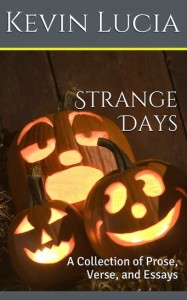
Kevin Lucia
September 22, 2014
Reviewed by Josh Black
A bit of a mixed bag as far as easy categorization goes, Strange Days collects eight stories that didn’t fit into the framework of Kevin Lucia’s debut collection Things Slip Through (two of which are accompanied by illustrations), two poems, and twenty-two essays. The stories and poems vary in genre and quality, culled as they are from a period of six years in which Lucia honed his craft and became more comfortable writing horror in particular (as he reminisces about in the essay section). The essays cover a wide range of subjects, from genre to childhood to faith to the mechanics of writing.
After a brief forward, “Therapy” starts things off. It’s a decidedly grim and nasty little piece, as an unlucky teen undergoes a session of “behavior modification therapy” that quickly devolves into modification of an altogether more nefarious sort. Readers of Lucia’s earlier collection will recognize a certain mad doctor in this one. It’s a brutal story in the sheer physicality of it, but also in the lines of regret and sheer helplessness driving the patient’s past into his unfortunate present.
“As the Crow Flies” continues the theme of being haunted by the past, though with a much different style and tone. It’s a taut revenge tale with a supernatural edge, dealing with abuse, madness, and murder.
The noir-tinged thriller “A Soldier Returns” again brings something completely different to the table, with its looming mystery, snappy dialogue, deadpan humor, and beautiful and damaged femme fatale. It’s an unexpected departure, but it works well, and fans of the style will be pleased with its inclusion here.
“Black Dog Whispers” is a bizarre flash fiction piece, going back to the visceral nature of the first story, near-hallucinatory in the telling.
Next is “Great Old Ones”, a Lovecraftian poem that ponders fate and the dark influence that just might lurk beneath the surface of our lives and what we’ve come to consider normalcy.
“Septic Dreams” can best be described as contemporary fiction. Although there are no grotesque monsters or rending of limbs here, some very personal and real-world fears run through its subtext. It strikes a fine counterpoint to the stories that precede and follow it.
The second and final poem in the collection, “Mr. Alistair Finnegan Black”, is a darkly humorous ditty about a man who knows your hopes and fears, and isn’t about to play nicely with them.
“Breathe” rounds out the straight-up prose section. It’s another offering of contemporary fiction, and a wonderful one at that. The entirety is a conversation between a father and his daughter, thrust by loss and disconnection into a world they’re both struggling in their own way to even put words to, let alone navigate.
“Graphic eBook: The Sliding” comes next. It’s an illustrated version of the previously published “The Sliding”, in its earliest incarnation. This will be of particular interest to those who have read Things Slip Through, but it stands on its own as a very creepy and effective “evil house” tale, and the artwork adds to the immersion. The story’s genesis is described in a later essay which is even more frightening because it actually happened.
“Lost Project: Asphalt Oceans by Midnight” is the first entry in a scrapped graphic serial that might yet see the light of day. As Lucia puts it, it’s “a story of a modern-day Beowulf duty-bound by his heritage to hunt down the teeming spawn of Grendel, which hid in night shrouded corners of the world, feeding on the weak and the helpless.” It’s a fast, fun, and monster-filled story that takes place at an out-of-the-way diner, and the included concept art helps to bring it to life.
Following this is the final section, “Essays: Thoughts about horror, writing, genre fiction, and life in general”, and it’s exactly what it sounds like. The draw here is that Lucia doesn’t even attempt to provide any hard and fast rules for writing horror. This section is all about his own experiences and journeys as a burgeoning writer (and reader), and it’s written with a great deal of warmth and candor. The anecdotal essays come across as one horror fan talking to another, and they’re both inspirational and encouraging in tone. Things like voice and style are touched on, as are the doubts and fears that come with being a writer and a person in general. The fact that Lucia puts so much of himself out there is commendable, and there’s a lot for beginning writers to gain from reading what he has to say here.
Strange Days is a portrait in words of one writer at a particular time and place in his career, recalling the past, taking stock of the present, and sharing his dreams for the future. As personal as some of the material is, much of it is also universal. It’s a good choice for all horror fans, from casual readers to hardened genre veterans, but it’s writers who are just starting to familiarize themselves with the craft who will get the most out of this one. Recommended.








